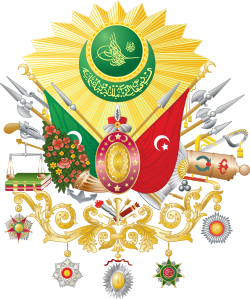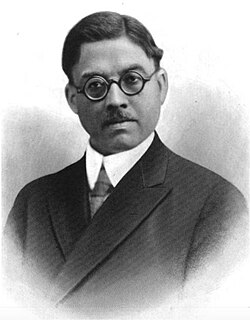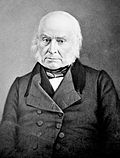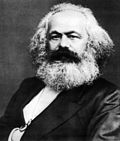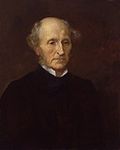Jesse Ventura
| Main | Topics and categories | Tasks and projects |
The Politics portal

Politics (from Ancient Greek πολιτικά (politiká) 'affairs of the cities') is the set of activities that are associated with making decisions in groups, or other forms of power relations among individuals, such as the distribution of status or resources. The branch of social science that studies politics and government is referred to as political science.
Politics may be used positively in the context of a "political solution" which is compromising and non-violent, or descriptively as "the art or science of government", but the word often also carries a negative connotation. The concept has been defined in various ways, and different approaches have fundamentally differing views on whether it should be used extensively or in a limited way, empirically or normatively, and on whether conflict or co-operation is more essential to it.
A variety of methods are deployed in politics, which include promoting one's own political views among people, negotiation with other political subjects, making laws, and exercising internal and external force, including warfare against adversaries. Politics is exercised on a wide range of social levels, from clans and tribes of traditional societies, through modern local governments, companies and institutions up to sovereign states, to the international level.
In modern states, people often form political parties to represent their ideas. Members of a party often agree to take the same position on many issues and agree to support the same changes to law and the same leaders. An election is usually a competition between different parties.
A political system is a framework which defines acceptable political methods within a society. The history of political thought can be traced back to early antiquity, with seminal works such as Plato's Republic, Aristotle's Politics, Confucius's political manuscripts and Chanakya's Arthashastra. (Full article...)
Selected article
The Local Government Commission for England was the body responsible for reviewing the structure of local government in England from 1992 to 2002. It was established under the Local Government Act 1992 replacing the Local Government Boundary Commission for England. The Commission could be ordered by the Secretary of State to undertake 'structural reviews' in specified areas and recommend the creation of unitary authorities in the two-tier shire counties of England. The Commission, chaired by John Banham, conducted a review of all the non-metropolitan counties of England from 1993 to 1994, making various recommendations on their future. After much political debate and several legal challenges, the Commission's proposals resulted in the abolition of Berkshire county council and the counties of Avon, Cleveland, Hereford and Worcester and Humberside. Combined with a second wave of reviews in 1995, under the chairmanship of David Cooksey, the Commission's proposals led to the creation of unitary authorities covering many urban areas of England. It was replaced by the Boundary Committee for England in 2002, which finished this review cycle in 2004.
Featured picture

Andrew Gregg Curtin (1817–1894) was a U.S. lawyer and politician. He served as the 15th Governor of Pennsylvania during the American Civil War. During the Civil War, Curtin organized the Pennsylvania reserves into combat units, and oversaw the construction of the first Union military camp for training militia. After the Battle of Gettysburg, Governor Curtin was the principal force behind the establishment of the National Cemetery there. After serving two terms as governor, Curtin was appointed ambassador to Russia by Ulysses S. Grant, and he later served in the House of Representatives from 1881 until 1887.
Selected quote
Selected biography
Harry Jheopart Capehart Sr. (May 2, 1881 – May 15, 1955) was an American lawyer, politician, and businessperson in the U.S. state of West Virginia. Capehart served as a member of the West Virginia House of Delegates, representing McDowell County for three consecutive terms, from 1919 to 1925. He also served as an assessor, city councilperson, and city attorney for Keystone, West Virginia.
Did you know (auto-generated) -

- ... that even though the Legislative Assembly of Quebec ordered a monument of Maurice Duplessis in front of its building, later premiers hid it for 16 years to avoid political tensions?
- ... that Nigeria's Muslim–Muslim ticket challenges the norm of religious balance in politics?
- ... that the limited study of the Afghani plants Aquilegia gracillima, A. maimanica, and A. microcentra has been blamed on political circumstances?
- ... that The Use and Abuse of History: Or How the Past Is Taught explores how school textbooks across the world distort history to serve political interests?
- ... that the ideas of Albert Schädler became the founding ideas of the Progressive Citizens' Party, though he himself was opposed to the formation of political parties?
- ... that Pakistani prime minister Mohammad Ali Bogra opposed the 1955 election to protect his political position?
More did you know...
- ...that a logocracy is government through words?
- ...that the Jewish Socialist Workers Party in the Russian Empire mobilized 3,000 of its cadres in self-defense militias during 1906?
- ...that the liberal film company Brave New Films has produced full-length videos and paper advertisements in addition to the viral videos for which it is known?
- ...that, at a congress in May 1921, all Socialist Party of Romania delegates who supported Bolshevik guidelines were arrested 24 hours after a vote on affiliation to the Comintern?
- ...that Ngo Dinh Diem became president of South Vietnam after a fraudulent 1955 election run by his brother Ngo Dinh Nhu, polling 133% of registered voters in Saigon?
- ...that the Brothers Grimm were amongst the Göttingen Seven, university teachers who protested changes to the constitution of the Kingdom of Hanover in 1837?
- ...that Caedwalla of Wessex conquered southeast England during his brief 7th century reign?
- ...that tiao-kuai is the quasi-federal administration system in China?
In this month
- June 28, 2004 - Canadian federal elections occur; the Liberal party loses its absolute majority.
News and Current events
- August 11: 4 local government areas in New South Wales, Australia locked down after COVID-19 case
- August 11: Australia: AstraZeneca vaccine access expanded by Victorian government
- August 1: Australia: Victorian lockdown lifted
- July 29: Tunisia's president dismisses prime minister, suspends parliament
- July 25: Australia: Wikinews interviews Reg Kidd, mayor of the City of Orange, about COVID-19 lockdown and local government
- July 23: South Australia enters week-long lockdown to contain COVID-19 Delta variant spread
- July 21: Technological University Dublin senior lecturer Dr Lorcan Sirr speaks to Wikinews on housing market in Ireland
- July 21: Three rural councils in New South Wales, Australia enter 7-day lockdown
- July 21: Australia: Victoria lockdown extended by a week with 85 active cases recorded
- July 15: California governor signs new state budget, eligible Californians to get stimulus payments
Topics and categories
General images
Related portals
Associated Wikimedia
The following Wikimedia Foundation sister projects provide more on this subject:
-
 Commons
Commons
Free media repository -
 Wikibooks
Wikibooks
Free textbooks and manuals -
 Wikidata
Wikidata
Free knowledge base -
 Wikinews
Wikinews
Free-content news -
 Wikiquote
Wikiquote
Collection of quotations -
 Wikisource
Wikisource
Free-content library -
 Wikiversity
Wikiversity
Free learning tools -
 Wiktionary
Wiktionary
Dictionary and thesaurus

 Read
Read
 AUTHORPÆDIA is hosted by Authorpædia Foundation, Inc. a U.S. non-profit organization.
AUTHORPÆDIA is hosted by Authorpædia Foundation, Inc. a U.S. non-profit organization.










